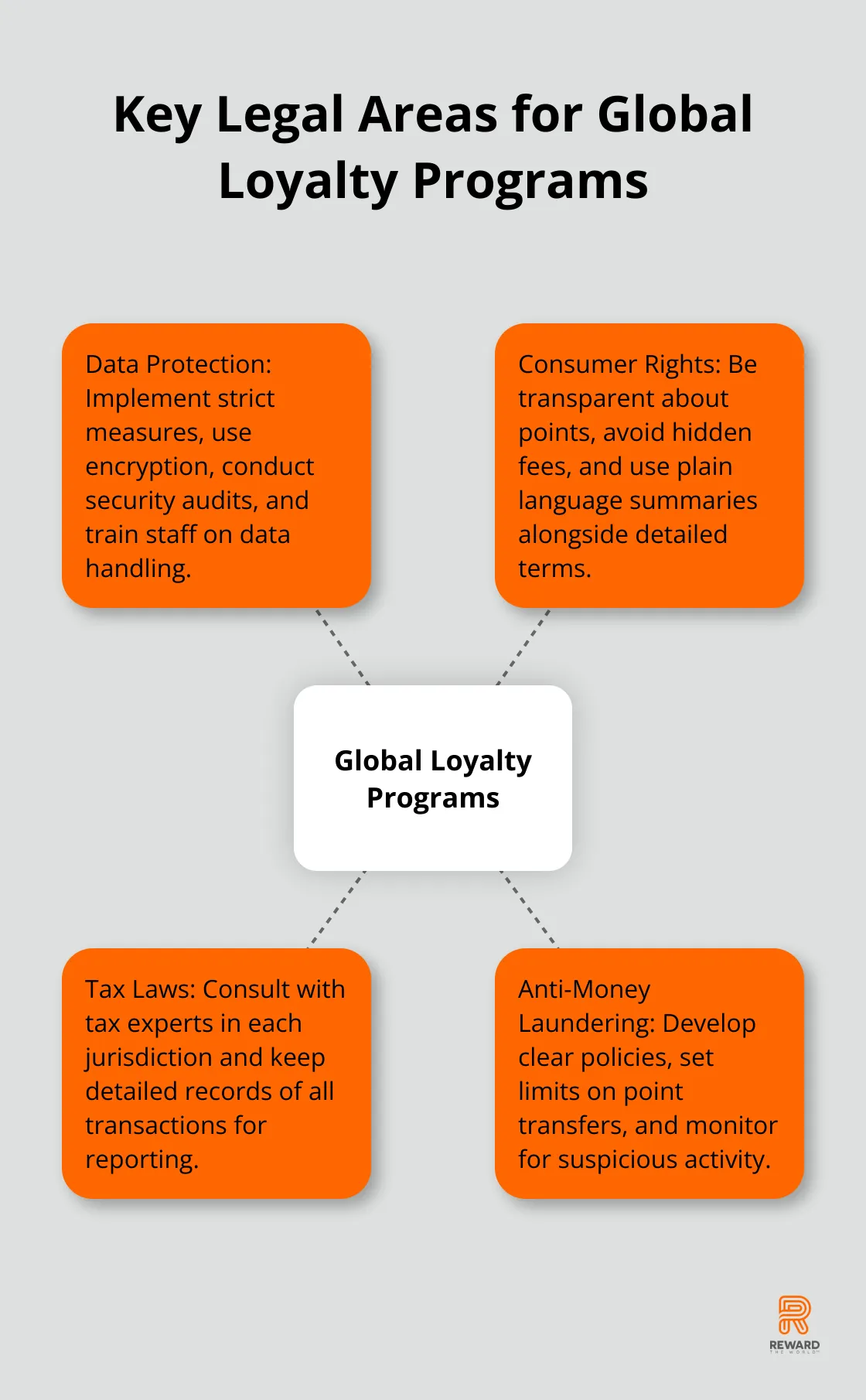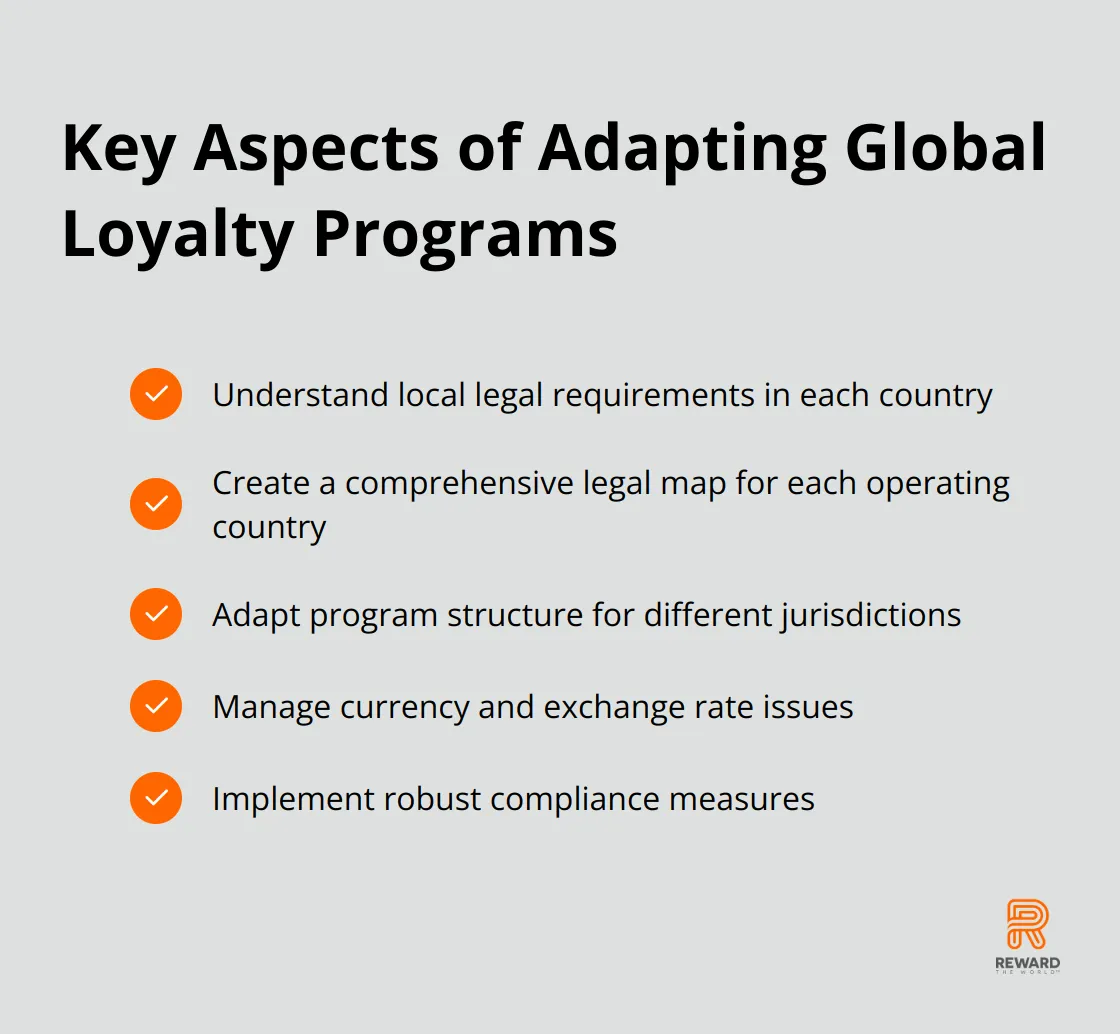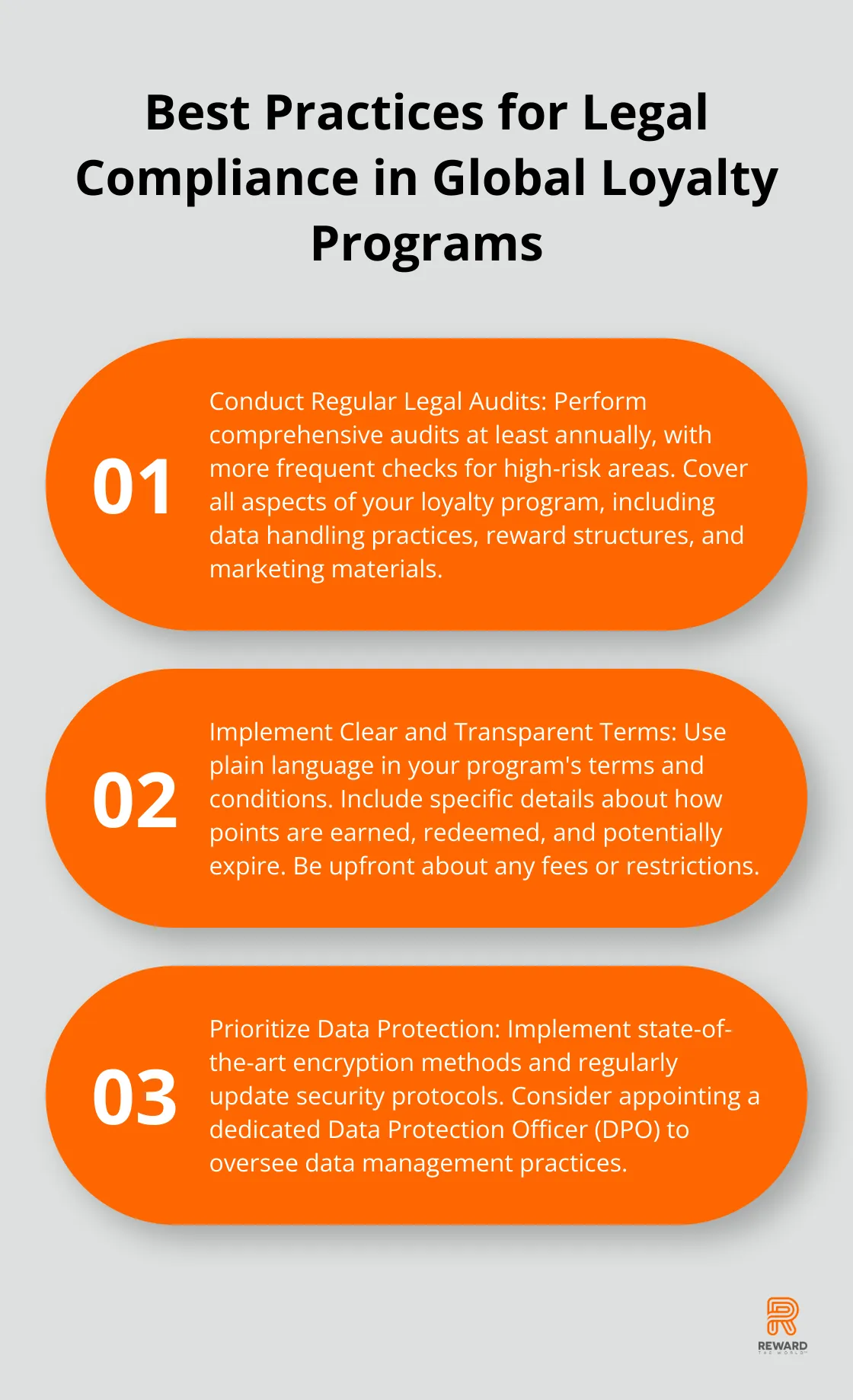
Global loyalty programs offer exciting opportunities for businesses, but they come with a complex web of legal challenges. At Reward the World, we’ve seen firsthand how crucial legal compliance is for the success of these programs.
Navigating data protection, consumer rights, tax laws, and anti-money laundering regulations across multiple jurisdictions can be daunting. This post will guide you through the key legal considerations and best practices for running a compliant global loyalty program.

Legal Maze of Global Loyalty Programs
Global loyalty programs face a complex legal landscape. We at Reward the World have navigated these challenges and can offer insights to help you stay compliant.
Data Protection and Privacy
The General Data Protection Regulation (GDPR) in Europe and similar laws worldwide have changed how companies handle customer data in the context of loyalty programs. To avoid hefty fines, companies must implement strict data protection measures. This includes using encryption, conducting regular security audits, and training staff on data handling procedures.
Consumer Protection Laws
Consumer protection laws vary widely across countries. Global brands need to be extra aware of loyalty program laws in Canada, South Africa, and Europe. Companies should be transparent about how points are earned and redeemed. They should avoid hidden fees or sudden changes to program rules. Using plain language summaries (alongside detailed terms) can improve understanding.
Tax Implications
Loyalty rewards can have tax consequences for both businesses and consumers. Companies should consult with tax experts in each jurisdiction where their program operates. Keeping detailed records of all transactions will simplify tax reporting.
Anti-Money Laundering (AML) Compliance
Loyalty programs can be exploited for money laundering. Companies should develop clear policies and procedures that outline their approach to detecting, preventing, and reporting money laundering activities. They should set limits on point transfers between accounts. Monitoring for suspicious activity (such as frequent high-value redemptions or unusual patterns of point accumulation) is essential.
Legal compliance isn’t just about avoiding penalties; it builds trust with customers and partners. Prioritizing legal compliance is an investment in the long-term success of your loyalty program.
As we move forward, we’ll explore how to navigate the complex web of cross-border regulations that global loyalty programs must contend with.
Navigating Global Loyalty Laws
Understanding Local Legal Requirements
Global loyalty programs must navigate a complex web of regulations that vary significantly from country to country. Every nation has its own set of rules governing loyalty programs. In the United States, the Federal Trade Commission (FTC) oversees loyalty programs and prohibits merchants from engaging in unfair and deceptive trade practices. The European Union enforces strict standards for data protection and privacy through the GDPR, with consent playing a central role in loyalty programmes.
To navigate this complexity, companies should create a comprehensive legal map for each country where their loyalty program operates. This map should outline key regulations, required disclosures, and any specific restrictions on rewards or point accumulation. Regular updates to this map are essential, as laws can change rapidly.

Adapting Program Structure for Different Jurisdictions
One size doesn’t fit all when it comes to global loyalty programs. What works in one country may violate laws in another. For instance, Japan has successfully implemented point systems in eCommerce stores to drive loyalty and earn repeat customers. Brazilian law prohibits certain types of sweepstakes commonly used in loyalty programs elsewhere.
To address these differences, companies should create a flexible program structure that adapts easily to local requirements. This might involve offering different reward options in various countries or adjusting point accumulation rates to comply with local laws.
Managing Currency and Exchange Rate Issues
Loyalty programs that span multiple currencies face unique challenges. Exchange rate fluctuations can significantly impact the value of points or rewards, potentially leading to customer dissatisfaction or even legal issues if not handled properly.
To mitigate these risks, companies should implement a dynamic pricing model that adjusts reward values based on current exchange rates (ensuring fairness across all markets). Additionally, clear communication about how currency conversions are handled in the program’s terms and conditions can prevent misunderstandings and potential legal disputes.
Implementing Robust Compliance Measures
Staying compliant with diverse global regulations requires a proactive approach. Companies should establish a dedicated compliance team (or work with external experts) to monitor legal changes and update program policies accordingly. Regular audits of the loyalty program can identify potential compliance issues before they become problematic.
Reward the World stands out as a top choice for businesses seeking a compliant global loyalty solution. Its platform is designed to adapt to various legal requirements across different jurisdictions, making it easier for companies to navigate the complex legal landscape of international loyalty programs.
As we move forward, we’ll explore best practices for maintaining legal compliance in global loyalty programs, ensuring your program not only follows the law but also builds trust with customers worldwide.
How to Ensure Legal Compliance in Global Loyalty Programs
Conduct Regular Legal Audits
Legal audits identify potential compliance issues before they become problematic. We recommend comprehensive audits at least annually, with more frequent checks for high-risk areas. These audits should cover all aspects of your loyalty program, including data handling practices, reward structures, and marketing materials.
Pay special attention to changes in local regulations during these audits. For example, the California Consumer Privacy Act (CCPA) introduced new requirements for loyalty programs operating in California. Unlike the CCPA, some regulations may not require opt-in consent, but consumers still must voluntarily agree to be enrolled in loyalty programs.
Implement Clear and Transparent Terms
Transparency is key to legal compliance and customer satisfaction. Your program’s terms and conditions should be clear, concise, and easily accessible. Avoid legal jargon and use plain language that your customers can understand.
Include specific details about how points are earned, redeemed, and potentially expire. Be upfront about any fees or restrictions. If points have an expiration date, clearly state this and provide reminders to customers as the date approaches.
Prioritize Data Protection
With increasing scrutiny on data privacy, robust data management systems are essential. Implement state-of-the-art encryption methods and regularly update your security protocols. The cost of a data breach far outweighs the investment in strong data protection measures.
Consider appointing a dedicated Data Protection Officer (DPO) to oversee your data management practices. This role is mandatory under GDPR for certain organizations and can significantly enhance your compliance efforts.
Invest in Staff Training
Your employees are your first line of defense against legal violations. Invest in comprehensive training programs that cover relevant laws and regulations. This training should be ongoing, with regular updates as laws change.
After the introduction of GDPR, companies that quickly trained their staff on the new requirements were better positioned to maintain compliance. Create role-specific training modules. Customer service representatives, for instance, should know how to handle data access requests and explain program terms to customers.
Stay Informed About Global Regulations
The legal landscape for loyalty programs changes rapidly. Establish a system to monitor regulatory changes in all jurisdictions where your program operates. Subscribe to legal newsletters, join industry associations, and attend conferences focused on loyalty program compliance.
Try to build relationships with local legal experts in key markets. These connections can provide valuable insights into upcoming regulatory changes and help you adapt your practices proactively. Ensure that terms and conditions governing loyalty programs are clear, fair, and easily accessible to consumers, and maintain transparency in your practices.

Final Thoughts
Legal compliance in global loyalty programs forms the foundation of trust and long-term success. Companies must navigate a complex web of international laws through vigilance, adaptability, and ethical practices. Proactive measures such as regular legal audits, transparent customer communication, and robust data protection systems ensure a legally sound loyalty program.
We expect increased scrutiny on data privacy and consumer protection in loyalty programs. Regulators will likely tighten controls on customer data collection, usage, and sharing. More standardized regulations across borders may simplify compliance for global programs in the future.
Reward the World offers a comprehensive platform designed to meet diverse legal requirements across multiple jurisdictions. Our global reach, multi-language support, and commitment to data protection make us a strong partner for companies aiming to build legally compliant loyalty programs. Legal compliance in loyalty programs requires ongoing effort and adaptation to changes.
